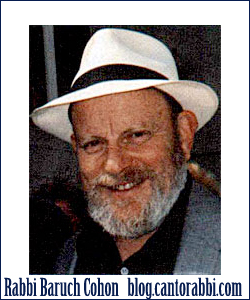HEEL AND TOE – Ekev – Deut. 7:12-11:25 – by Rabbi Baruch Cohon
The name of this week’s reading is Ekev – meaning a result. As a result of listening to the commandments and following them, you can expect to accomplish good things in your life. And not listening will bring on consequences we don’t want to suffer. Interestingly enough, ekev also means Heel. The imagery is dramatic: just as the heel follows the toe, so results follow our actions.
Moses brings this message to the people in one of his farewell speeches, reminding them of their experience in the desert, the results of their actions both positive and negative. He urges them to listen and to do what is right, for their own good.
Of course, Moses was not the only leader who gave the people such messages. Just a few weeks ago we read in the Haftorah of Balak a message from the prophet Micah: “It has been told you, man, what is good and what the L-rd wants from you: to do justice, to love mercy and to walk humbly with your G-d.”
Down through the ages, lawgiver, prophet and sage keep trying to teach us basic values. Personally this week is very special for me, because this week I observe Yortzite – the anniversary of my father’s death. My father of blessed memory was a rabbi and a teacher of rabbis. The last sermon I ever heard him deliver was based on both of these texts. In fact, he contrasted them. Here, in effect, was his message:
Micah stresses three ideals: justice, mercy, humility. These make the character of a religious human being. Moses also stresses three ideals: fear of G-d, love of G-d, and service to G-d “with all your heart and soul.” The parallels are not hard to draw. The biblical concept of fear of G-d implies reverence. Not fright but supreme respect. If we truly revere G-d we want to pattern our lives after the qualities we associate with Him. And justice is one primary attribute of Divinity. Midas haDin, the measure of justice we recall with such drama on Yom Kippur. So reverence – Moses’ first ideal – leads to doing justice to each other — Micah’s first ideal.
Love of G-d is actualized by love of our fellow creatures. We believe that we all carry the Divine image in us. That image includes Midas haRahamim – the quality of mercy (not strained, Mr. Shakespeare). We should treat each other with kindness, carrying over some of the respect we feel for G-d into a mutual respect in dealing with people. Micah’s second ideal – loving mercy – is the clear result.
And serving G-d with total sincerity implies a type of attitude and a type of conduct. Moses said la’avod. Avodah is one Hebrew word that has two meanings: Work, and Worship. To worship G-d with sincerity requires an attitude of humility. You can’t pray honestly unless you feel a good deal less important than the Divinity you pray to. And you can’t strive to do better and better work unless you feel that you yourself are less than perfect. Unless, that is, you have some humility. When Micah said “walk humbly with your G-d,” he meant exactly that.
Then my father went on to point out the difference between these two prophetic messages. The difference comes in the very next sentence, where Moses says lishmor es mitzvos haShem – “Keep G-d’s Mitzvos!” That is the tool he gave us at Mount Sinai, the tool to carry out and accomplish these ideals.
Micah said nothing about Mitzvos. For a very good reason too. Micah was addressing the whole human race: Adam – Mankind. Moses was addressing Yisrael – the Jewish people. For us, Mitzva is the key that unlocks the door of a better life.
Keeping the spirit of these Mitzvos and putting it into action brings good results…as the heel follows the toe. Thanks to Moses and his interpreters, we have 613 of them. Grab a few!
You can contact Rabbi Baruch Cohon for further discussion and/or comments at: baruch.c.2011@gmail.com


